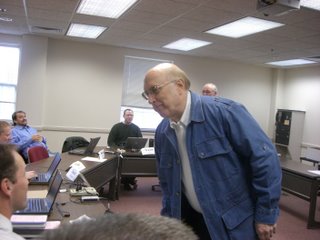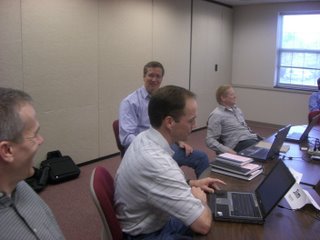 An advocate of many of the Willow Creek style church growth strategies, Dr. Hunter listed four barriers the church faces when reaching out to people who aren't Christians.
An advocate of many of the Willow Creek style church growth strategies, Dr. Hunter listed four barriers the church faces when reaching out to people who aren't Christians. The barriers are as follows (most unreached people are at level one and have to work their way through level four):
The barriers are as follows (most unreached people are at level one and have to work their way through level four):- Image Barrier: The tarnished image of the church in the broader culture is a barrier for many. Also, the image of the church as irrelevant and boring plays a role here.
- Culture Barrier: The style, language, aesthetics, and music that make up the culture of the church can be a barrier for some.
- Gospel Barrier: The barrier that is the nature of the gospel. Some accept. Some reject.
- Total Commitment Barrier: This is the barrier that keeps a person from becoming fully devoted believers in Christ, the one where people wind up just attending worship services and calling it a day.
 My question for Dr. Hunter that was never answered (not his fault) was whether or not the way we handle the first two barriers changes our ability to inspire people to move through the last two barriers. He believes that the nature of the gospel demands that Christians live by someone else's agenda (God's) and not our own.
My question for Dr. Hunter that was never answered (not his fault) was whether or not the way we handle the first two barriers changes our ability to inspire people to move through the last two barriers. He believes that the nature of the gospel demands that Christians live by someone else's agenda (God's) and not our own.What I wanted him to address is whether or not we can cater to a person's own agenda (when handling the first two barriers) and then switch horses in mid-stream for the last two barriers by telling them that the Christian life is not about a person's own agenda.
 The classroom discussion on Monday morning was good. Dr. Hunter let difficult questions rise to the surface, especially questions about why the church has so often failed to address weighty sins like injustice and oppression while being more anxious to focus on what Dr. Hunter called "rinky dink" sins.
The classroom discussion on Monday morning was good. Dr. Hunter let difficult questions rise to the surface, especially questions about why the church has so often failed to address weighty sins like injustice and oppression while being more anxious to focus on what Dr. Hunter called "rinky dink" sins.Of course, nothing was solved. Nothing ever is in a classroom. But it was good to be challenged about the nature of the church and the purpose of the church--and to keep God's purposes at the center.

2 comments:
Too bad your question wasn't answered, Aaron -- I'd love to know how that's possible. From my perspective, it does seem a bit disingenuous to, as you put it, switch horses midstream.
However, at what point does adapting to culture (in a sense, even using the vernacular qualifies as an adaptation to culture) cross the line into propping up a person's 'own agenda'?
The lines are hard to distinguish. On one hand we have the incarnation which is the ultimate in inculturation (i.e. I'll be born and reared among the people with whom I am going to communicate). On the other hand (or IN the other hand) we have a cross . . . foolishness and a stumbling block.
Post a Comment